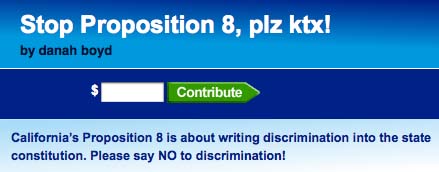I am proud to be an American, but utterly ashamed to be a Californian. Although I knew that Proposition 8 would be close, I still can’t accept that Californians voted to cement discrimination into the state constitution. We have a long history of discrimination in this country. As Anil points out, it wasn’t that long ago when people from different racial backgrounds were forbidden to marry. I realize that in a decade or two, we will look back with horror at the time when Americans thought it was right to treat people differently based on who they loved. I have to smile when I think of Jon Stewart’s coverage of “traditional marriage” in the middle ages. What is the idyllic model that people have in their heads wrt marriage? The Hollywood produced romantic comedy? Are all relationships that don’t live up to that dream invalid?
At this point, I’m struggling with what to do about Prop 8. Anyone who has seen my claustrophobia in crowds understands why protesting isn’t functional for me. I signed (and encourage you to sign) the petition to re-open Prop 8. But that’s not that satisfying.
I’m also struggling because I don’t believe that legal action is the best recourse. When I was in college studying Roe v. Wade, I reached the conclusion that the Supreme Court did a huge disservice to women. Let me explain. At that time, each state was slowly working to legalize abortion. People were coming around to the idea, one at a time. The liberal states went first, but it was gaining momentum. And then the Supreme Court stepped in and declared it legal. The result was hugely divisive. Those who hadn’t come around to it began to reject the Court. Others decided that they should build up anti-choice lawyers to invade the court. Rather than happening naturally and with the support of the masses, the Court’s involvement created a dangerous socio-political divide that we live with today.
There’s no doubt in my mind that Prop 8 is pure discrimination and should be declared unconstitutional. That said, I worry that a legal fight stemming from California will create another Roe v. Wade situation. I was hoping that California would be a leader in this, just like Massachusetts. But it’s going to be ground zero for the fight. I just think that we need to fight it on cultural grounds, not on legal grounds.
I think that we need to spend the next year convincing those around us that this is discrimination. I think that everyone – gay and straight – needs to start conversations about what it means to be in a same-sex loving relationship. I’m not interested in trying to convince people that their churches should accept same-sex marriage. I’m interested in helping people understand that church marriages are not the same as state marriages. And that when it comes to the state, it’s of utmost importance that there’s no discrimination. The Catholic Church is more than welcome to discriminate wrt marriage. They already do. You can’t get married in a Catholic church if you’re not Catholic. But the state should not be discriminatory, especially when so many rights and freedoms and economic benefits are afforded to married couples.
I still loathe marriage as an institution. I’m still resentful over the baked-in, state-supported misogyny that I witnessed as a child. That said, I recognize (and benefit from) the privileges it affords and I strongly believe that it should be available to everyone everywhere who is in a loving relationship and wants to make that lifelong commitment.
So what’s the right move? How do we create an education movement and not a protest or legal movement? How do we turn hearts and minds? I have to admit… I *loved* the anti-discrimination ads that came out of the No on 8 campaign. How do we continue to fund information-based advertisements and get them in front of those who are in favor of denying freedoms to some? In other words, no more ads on Comedy Central, but a lot more on Fox and the channels that those who favored 8 are most likely to watch. How do you create a movement to change the hearts and minds of Californians? Let’s reintroduce the ballot measure next year, but in the meantime, work to convince people that this was the wrong decision. If we take this route – and not the legal route – I think that we will be able to do far more good in the long run.


